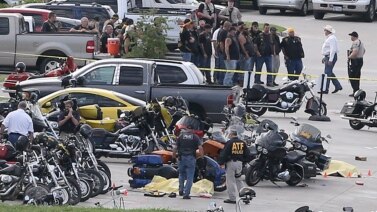Some law enforcement officials in the United States say motorcycle clubs are criminal gangs. Investigators were especially critical of such clubs after a shooting in May in the southwestern city of Waco, Texas. Several groups of motorcyclists had gathered at a restaurant. There was a dispute, and members of competing clubs began shooting at each other. Nine people were killed and 18 others wounded.
But motorcyclists say they are not criminals and should not be treated as lawbreakers. Some of them note that they have been meeting for years without being charged with a crime.
Our story begins at the Hawg Stop restaurant and bar in Houston, Texas. A few hundred members of motorcycle clubs from the Houston area went there recently for food and drinks.
Police had said they would watch the situation closely. Yet there was no sign of police officers there, and the gathering appeared peaceful.
Lawyer Joey Lester has represented motorcycle clubs from across the country. He says almost every time motorcyclists meet, the gathering is a peaceful event.
"We have had eight- or nine-thousand of them over the last 30 years. We have never had any problems -- even little problems -- at any of these meetings. That thing in Waco was an aberration.”
Mr. Lester says it appears police overreacted when they arrested 170 people at the gathering in Waco. Police charged those they arrested with criminal conspiracy.
“You are supposed to have evidence against each person in order to bring a charge like that against them, so what they did -- what law enforcement did there -- was a travesty of justice in my opinion.”
Some legal experts say police were justified in making mass arrests, given the disorder at the time of the shootings. Many of those arrested were released after appearing in court. They made a bond payment and promised to return when a trial date is set.
At the meeting in Houston and at a recent large gathering in Austin, Texas, there were no signs of tension between motorcycle groups.
Tracy White is a member of a biker club. She says the clubs welcome everyone.
“We don’t go by your race, we don’t go by your age -- none of that matters. Everything is transparent; love is love.”
The meetings are well-organized and follow rules. Prayer is also part of the meetings. Reverend Rocky Summerfield operates a group called “We Will Ride Ministries.”
“Some of these guys they don’t feel comfortable with a, a church setting, so we, this, this is our mission field.”
A member of the Wild Dillos club named “Slick” says he works at a bank during the week.
“Wearing a coat and tie, and on the weekends, I like to put my jeans on and my jacket and vest and ride my Harley (motorcycle).”
Clubs say some of their members include lawyers, doctors and bankers. Other members have low-paying jobs.
Some bikers belong to clubs with a rough reputation. They almost always wear black leather clothing. Their appearance might be frightening to an outsider. It is difficult to know just by looking at them which members are criminals and which are not.
Reverend Summerfield says most club members obey the law, love their country and pay their taxes.
“(It's) no different than a ladies tennis club. You know, they have an interest in playing tennis and whatever. We just have a big interest and camaraderie of riding motorcycles.”
I’m Christopher Jones-Cruise.
VOA Correspondent Greg Flakus reported this story from Houston. Christopher Jones-Cruise adapted it for Learning English. George Grow was the editor.
Words in This Story
gang – n. a group of criminals
club – n. a group of people who meet for an activity
aberration – n. something (such as a problem or a type of behavior) that is unusual or unexpected
conspiracy – n. a plot
travesty of justice – idiom. a miscarriage of justice; an act of the legal system that is an insult to the system of justice
bond – n. the amount of money that someone promises to pay if a prisoner who is allowed to leave jail does not return later for a trial or to prison; an agreement to pay bail
transparent – adj. honest and open; not secretive
setting – n. the place and conditions in which something happens or exists
mission field – idiomatic religious expression. an activity during which, or a place where, religious workers seek to convert people to believe in the workers’ faith
jeans – n. pants made of a strong cloth (called denim)
rough – adj. having a lot of crime or danger
reputation – n. the common opinion that people have about someone or something; the way in which people think of someone or something
leather – n. animal skin that is chemically treated to preserve it and that is used in making clothes, shoes or furniture
tennis – n. a game that is played by two people or two pairs of people on a special court (called a tennis court) where they hit a small ball back and forth over a net using rackets
camaraderie – n. a feeling of good friendship among the people in a group
Do you have motorcycle groups in your country? We want to hear from you. Write your thoughts in the comments section.
